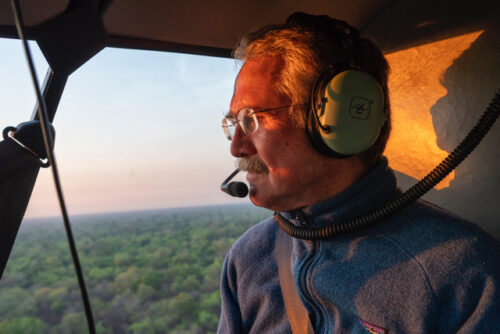Image Courtesy of Charlie Hamilton James.
David Quammen (YC ‘70) gestured behind him to a large glass tank on the floor of his office. “Over there is a rescue python that shares this office with me. He’s lived here for four years. His name is Boots,” he said, with a note of pride. The same love of nature that prompted Quammen to catch snakes and bugs as a boy continues to be a major influence in his work as a science non-fiction writer. Throughout his long career, Quammen has written numerous essays and books on the natural world and the forces that drive it, including a monthly column in Outside magazine that he has continued for fifteen years, numerous pieces for National Geographic, and a book on COVID-19 titled Breathless.
Quammen’s journey to becoming a non-fiction author began with a love of nature and writing that transitioned seamlessly into his studies at Yale. In the summer between his junior and senior years, Quammen traveled to a troubled neighborhood in Chicago to work as a community organizer. That experience inspired his first book, To Walk the Line, which he wrote on yellow legal pads in his dorm room and published in 1970 after his mentor, Pulitzer Prize-winning novelist Robert Penn Warren, recommended it to an editor.
After finishing his education at Yale with an English degree and spending two years at Oxford on a Rhodes Scholarship studying the works of William Faulkner, Quammen decided he wanted a change of scenery. “I was tired of ivy-covered walls, I was tired of being in school, and I was tired of being in elite institutions. […] As I thought of it then, I wanted to live closer to the ground,” Quammen said. Using the profits from the publication of his first book, he bought a Volkswagen bus and packed it with Penguin paperbacks, an electric typewriter from his parents, and a fishing rod, before driving to Montana. Not foreseeing how long he would spend there, he ended up staying for a lifetime. He worked for thirteen years before he published his second book, writing in the mornings while working as a bartender and a fishing guide to cover his living expenses.
While he was in Montana, Quammen reconnected with the natural world. “[My interest in the natural world] reawakened now that I was in a place that had mountains and wildlife and rivers filled with trout and snow,” Quammen said. Meanwhile, he became fascinated with Darwin’s works and with scientific writing in general. In 1980, after pitching an article on the benefits of mosquitoes to an editor of Outside magazine, he began writing its monthly nature column. In the process, Quammen’s focus transitioned from novels and essays on natural history to science writing about theoretical ecology and the history of evolutionary thinking. “As passionately interested in and impressed by William Faulkner and his novels as I was, I became that interested in and impressed by Charles Darwin,” Quammen said. This focus on non-fiction writing led him to pursue a successful career writing about Ebola, molecular phylogenetics, and a biography of Darwin himself.
The vast amount of Quammen’s research is conducted through two avenues: extensive reading of scientific journal articles and interviews with experts (he conducted ninety-five Zoom interviews for Breathless), with occasional field visits. His next book, to be published in May 2023, is drawn from a collection of conservation-related pieces originally published in National Geographic, titled The Heartbeat of the Wild. After that, he will resume work on a book on cancer as an evolutionary phenomenon. The novel contains a number of counterintuitive cases, such as devil facial tumor disease (DFTD), a cancer affecting Tasmanian devils. Cancers are almost never transmitted between individuals, instead arising due to time, genetic mutations, or environmental factors. However, DFTD is a transmissible cancer that spreads through bites, indicating that cancer is an evolutionary phenomenon and that tumors can adapt over time. This interplay between evolution and cancer fascinates Quammen, and he is excited to conduct more research.
Quammen is looking forward to whatever comes his way, but is experienced enough to know that life is unexpected. “Life doesn’t follow your plans. […] You gravitate toward things that a) interest you and engage your passions, but b) allow you to pay for food and shelter,” Quammen said. He still lives in Bozeman, Montana with his wife, an assortment of dogs and cats, and, of course, Boots.

